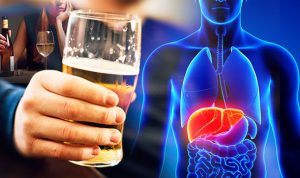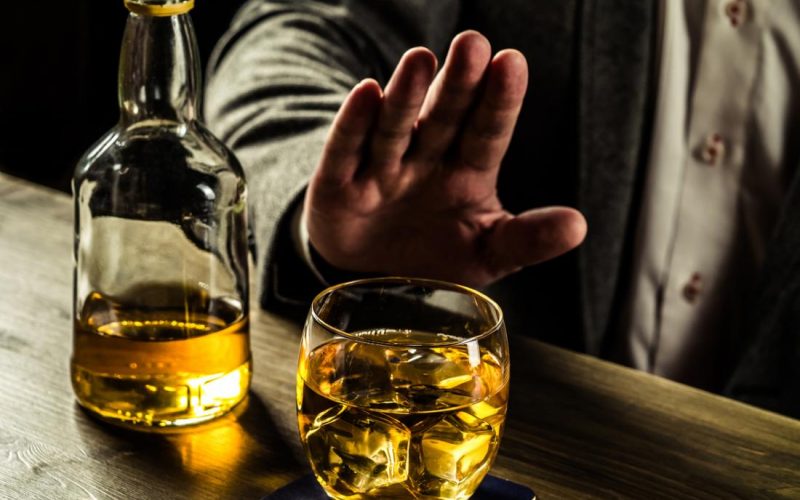 If you don’t have control over how much you drink and you get into real emotional troubles when not drinking, then you’ve got an alcohol use disorder, also called alcoholism. Alcoholism is a nasty physical and mental disorder that is daily affecting millions of people in the US and other parts of the world.
If you don’t have control over how much you drink and you get into real emotional troubles when not drinking, then you’ve got an alcohol use disorder, also called alcoholism. Alcoholism is a nasty physical and mental disorder that is daily affecting millions of people in the US and other parts of the world.
Alcoholism is a major brain disease that calls for your willpower and support from professionals if you want to stop drinking. Depending on the severity of your addiction, it can be a tough task to withstand the withdrawal symptoms on your own. If you quit drinking using your willpower alone, chances of a relapse are almost obvious.
Alcohol dependency causes major problems in your brains, making it tough to quit drinking. Remember, during your active addiction, your brains were so used to alcohol to an extent that it’s hard to survive without drinking.
How Do You Know That You Are An Alcoholic?
 If you feel like you have to drink and you don’t have control over how much you should drink and you struggle with your emotions when not drunk, then you have an alcohol use disorder and you need to find help immediately.
If you feel like you have to drink and you don’t have control over how much you should drink and you struggle with your emotions when not drunk, then you have an alcohol use disorder and you need to find help immediately.
What affects many people till now and they end up suffering a lot from alcohol use is denial or being unaware that they have a drinking problem. They don’t want to admit to the fact that they have become alcohol addicts and that they need help. The severity of the addiction becomes tough and treatment becomes complicated. A problem that could have taken few months to treat ends up taking years simply because someone neglected his condition and then the situation worsens. When things are tough, that is when you find many people rushing to see a doctor, but it shouldn’t be like that. But all the same, it is never too late to quit drinking.
Learn The Safest, Effective And Healthy Way To Stop Drinking
Therefore, now that you’ve decided to quit drinking, the best thing to do is to learn the safest, effective and healthy treatments and approaches on how to stop drinking. There are various procedures you can use to stop drinking. You can opt for cold turkey method or visiting a doctor for professional medication and support. Cold turkey involves in-home treatments and not advisable to be used in critical cases of drug/alcohol addiction.
How To Choose The Right Treatment Options
When you visit a doctor and discuss your drug / alcohol addiction condition, you’ll be given the right treatment options specific to your condition and that which matches with your ideal goals for alcohol cessation. You need to find the most suitable combination of treatment options that work for you.
Depending on the severity of your addiction, your doctor will advise you whether to go for an in-patient or out-patient program. In-patient treatment program requires that you stay in the rehab centre for a given duration when under close supervision of medical professionals. This is normally recommended for severe cases of addiction. If your condition is stable, your doctor may require that you enter an out-patient treatment program whereby you are supposed to see the doctor on regular appointments for a given duration of time.
Types Of Alcoholics
Before we proceed further in this topic, it is very important first you know the type of alcoholic you are so as to help you find the best treatment for your condition. According to the National Institute of Health, there are 5 sub- types of alcoholics meaning that alcoholism is not the same to everyone. It varies based on the severity of the condition and other factors like age, family history of alcoholism, other health problems and other substance abuse as well as socioeconomic factors.
5 Sub-types Of Alcoholics
In order to find the right treatment option for alcoholism, it is very important that medical professionals analyse the alcoholic condition thoroughly. For long-term results of alcoholism treatment to be achieved, the patient must be helped through to deal with both the internal and external factors that has contributed to alcohol abuse.
We find that in most cases, children coming from families with alcohol drinking history are more likely to engage in alcoholism at a very tender age. The environment our children are brought up in also majorly contribute to drug and substance abuse in their childhood and teenage years. Peer influence, curiosity, stress, financial problems and background history are among the major causes of alcoholism.
Let’s look at the 5 sub-types of alcoholics
- Young antisocial – this group of alcoholics includes individuals with a family history of alcoholism or alcohol users with some mental health disorders. This subtype alcoholics amounts to 21% of all cases of alcoholism and majority of people in this group are involved in smoking or other substance abuse like cocaine and marijuana. They are also found to be having antisocial personality disorder or suffering from mental disorders like depression and anxiety. Majority of victims in this case drink regularly and they find help for their drinking habits.
Young adult – research shows that young adults are among the most affected group in matters of alcohol addiction. Young adults struggling with alcohol dependency amount to about 32% of all alcoholism cases reported. This is the group of individuals who get involved in drug / alcohol use at a very tender age and by the time they hit 20, they are already in alcohol addiction. Majority of them engage in beige drinking since they cannot afford to drink regularly since they are schooling and cannot afford the time and money to spend with alcohol drinking. Young adults rarely seek treatment for alcoholism but their chances of engaging in other substance abuse or mental problems is rare.
Beige drinking is the kind of alcohol abuse whereby an individual drinks exceeding amount of alcohol in one sitting. In this case, most of these people drink during weekend and holidays.
- Intermediate familial- according to research by the Drug and Alcohol Dependence, individuals categorised in this subtype are fund to be high-functional but they may be engaging in other substance use and chances of suffering from mental health disorders are very high. Majority of them are likely to have come from families with drug / alcohol use.
They form about 19% of people struggling with alcoholism and out of them only 25% seek medical help.
- Functional – this subtype includes middle aged individuals who may either have a family history of alcoholism or suffering from mental health disorders like severe depression. One fifth of all people struggling with alcoholism are functional type. This group of drinkers is a bit stable and the alcoholics are able to cope with family, job and their personal lives as well. What is so common with these people is that they are usually unaware that they are suffering from some mental disorders and that is why they use drinking as a form of calming their situations. Most of them drink heavily at night and they wake up the following morning and carry out their duties as usual unaware that they have a drinking problem. Drinking problem continues to dangerous levels with time.
- Chronic severe- these are heavy drinkers suffering from severe mental problems and most of them have suffered from other alcohol / drug addiction problems. This group comprises of about 9% of all people struggling with alcoholism. Chronic alcoholism is dangerous and treatment process can be quite difficult. Majority of individuals in this group suffer from life-threatening withdrawal symptoms and are highly advised to seek medical help during alcohol recovery.
It’s Too Early To Give Up, Yet!
Struggling with alcohol addiction is not the best of experiences. It reaches to some point especially when drinking becomes severe even after several attempts to stop drinking and many people despair on their quest to alcohol recovery.
Though it is very important that everyone becomes aware of their drinking habits and seek help as early as possible, it is never too late to find help. No matter your current alcohol addiction state, don’t give up yet. You are not alone. Millions of people around the globe are going through what you are experiencing and they are finding help.
Why You Need Help From Addiction Recovery Specialists
Drug / alcohol recovery can be a life-threatening experience characterised by serious withdrawal symptoms. In severe use disorder, the patient is first taken through the detox process. This stage involves flushing out every substance in the system and during the first two to three days, the withdrawal symptoms are very severe, hence the need for proper professional supervision and support. This process might take a few days or weeks.
Symptoms of withdrawal
- Hallucinations
- Anxiety
- headaches
- Tremors
- Insomnia
- Abnormal heartbeat rates
- Anorexia
Learn How To Take Charge Of Your Drinking Habits Today
If you are sick and tired of your nasty alcohol addiction and you need to bring your life back on track, you’ve got to take charge of your drinking habits. I’m not saying you stop drinking instantly, but I am talking about your day to day actions that will finally bring your freedom and sobriety. This procedure is suitable with people whose addiction is not severe.
Yes, your family friends and doctors can do anything to help you out of alcohol addiction, but your willingness, discipline and patience can work magic for you. There’s something you can do every day and find a solution to a problem that looked like a huge mountain before you.
What Is It That You Can Do?
First, you need to do a close examination of your daily drinking habits. It’s called self-evaluation. Do an evaluation of your regular drinking day and note down how much you drink, at what times drinking begins and ends and the alcohol amount consumed that day. This helps you know how your drinking day looks like and the results can be really shocking.
Then, take an action to control your drinking habits. For instance, you can opt to start drinking an hour later and substitute an alcohol drink for water and finally try to stop drinking at least one hour before your usual time.
If it becomes hard to honestly evaluate yourself, then you can seek intervention from friends and family. Chose to work with people who have conquered alcohol addiction before and share your drinking problems with an experienced person. They will help you out as well as inspire you on what they did and how it worked towards their addiction recovery.
Did It Work For You?
If no, then don’t give up. Visit your local rehab facility and find a long-term solution to your alcohol addiction.
What To Expect When You Visit A Rehab Centre
Everyone has different opinions when it comes to visiting a rehab facility. In order to make it easy for yourself and kill any form of nervousness in you. You need to be physically, psychologically and mentally prepared of what to expect at the rehab facility.
When you visit a healthcare provider, you discuss your alcohol / drug addiction history with your doctor. The addiction specialists discusses with you the risks involved during alcohol recovery treatment and the need for sobriety. A thorough examination on your health is done for the doctor to find if there are other major health concerns so as to prescribe a treatment program that is very specific to your condition.
Stages of alcohol drinking treatment
There are three stages of drugs / alcohol treatment. We have the medical detox, rehabilitation and maintenance.
Medical Detox
If you are looking for the safest, healthiest and fastest way to stop drinking, medical detox is best for you especially if you had a continued alcohol abuse. To help you stay focused on your healing and recovery, a one-on-one counselling with a healthcare provider marks the foundation of your treatment process where you get addiction education to improve your mental understanding of alcoholism.
When you begin your recovery process from a point of understanding, such that you are well prepared to face any physical and mental challenges that possibly arise before you achieve your long-awaited sobriety, then you can overcome any form of pain or trauma.
Is in-patient alcohol treatment for you?
During your one-on-one discussion with your doctor, you’ll be asked some several questions to determine if in-patient treatment is the thing for you. This is to test you can stay in the rebab centre till your condition becomes sober. If you have a tight work schedule or have family responsibilities like children to look after, then it might be tricky for you to stay in the rehab facility during recovery.
Being in an in-patient drug / alcohol treatment means that you won’t be working and you also don’t have childcare responsibilities. It also implies that there is limited family contact and that you’ve no unstructured free time. You stay within the facility while under close supervision of your healthcare provider. The best thing about this is that in case of any emergency during withdrawal, you get a quick attention and this can save your life.
As you make great strides to recovery, then your doctor can permit you to go home and be coming to see him on scheduled appointments. This means that you are now allowed to carry out duties that were restricted earlier.
Are You Longing For Sobriety?
If you’ve given up on your drinking habits, I’m pretty sure that you are longing to get your life back on track. Drug dependency or alcoholism affects your lifestyle in a huge way. It affects your family relationships and sex, profession, health, spirituality and every other aspect of your life. To some extent, simple tasks like grooming becomes a real issue and this affects your outlook negatively. What you need is to learn how to stop drinking the healthy way.
How To Prevent Relapse
 Relapse is going back to heavy and uncontrolled alcoholism or drug dependency after a period of abstinence. According to the National Institute on Alcohol Abuse and Alcoholism, chances of alcoholism relapse are high even when proper treatment is given. The reason is because during active addiction, when faced with life stressors and challenges, you were used to drinking alcohol to help you go through your issues. This badly affects your minds and you get so stressed or even depressed now that you are facing your stressors without the influence of alcohol.
Relapse is going back to heavy and uncontrolled alcoholism or drug dependency after a period of abstinence. According to the National Institute on Alcohol Abuse and Alcoholism, chances of alcoholism relapse are high even when proper treatment is given. The reason is because during active addiction, when faced with life stressors and challenges, you were used to drinking alcohol to help you go through your issues. This badly affects your minds and you get so stressed or even depressed now that you are facing your stressors without the influence of alcohol.
If proper support is not given, it becomes quite hard for you to overcome the severe stress and the only way out is to find a quick relief to pain, anxiety, stress and depression by taking a drink. If this happens, you become a heavy drinker and it becomes quite a task for you to control drinking again.
In order to prevent relapse even after a severe addiction, you must be physically and mentally prepared to face whatever comes your way knowing that the condition is not permanent. Your doctor will give you some medications to help you overcome difficult withdrawal symptoms.
Also, you need to know that relapse does not mark the end of your recovery journey. All what you need is to take it positively and take it as a learning step to help you in the course of your recovery process. Relapse can happen one or more times, but it takes patience and courage to go back to treatment programs till sobriety is achieved. Relapse is common and you should not develop self-judgement or guilt. If it happens, don’t be afraid of trying again and again till you achieve your goals of alcohol cessation.
Rehabilitation
 After a successful withdrawal, you now start the rehabilitation process. At this point you’ve achieved stability but sobriety is still some miles ahead. Your healthcare provider puts you in support groups and you are given specific appointments to see your doctor for your progress to be monitored.
After a successful withdrawal, you now start the rehabilitation process. At this point you’ve achieved stability but sobriety is still some miles ahead. Your healthcare provider puts you in support groups and you are given specific appointments to see your doctor for your progress to be monitored.
Being in the rehabilitation stage doesn’t mean that cravings and deep urges for alcohol are gone. You will still find yourself being tempted to take a drink without anyone noticing it, but if you stay committed to your treatment program, you can overcome this.
Stay active in your support groups. Feel free to ask any question and share your concerns without fear. Your honesty and truth about your feelings and experiences will help your doctor find the best way to handle your condition and provide every necessary support needed.
Any moment you feel like you don’t want to attend your support groups and you don’t want to contribute towards the discussions therein, then know that you are very likely to enter an alcoholism relapse and this is very dangerous. The moment you realise signs of a relapse, seek medical help immediately.
Maintenance
The third and final alcoholism treatment phase is the maintenance stage. This one of the best procedures to help you work out your way towards sobriety. Your condition is now stable and you can move on with your normal life but you need to attend your appointments with the doctor till your recovery process is successful.
What You Must Do To Stop Drinking Absolutely
When starting an alcohol treatment program, everyone swears never to drink again. But is this always the case? No! I know you must have hard cases of people who have stopped drinking for months or years but they find themselves drinking later.
In order to ensure that you stop drinking completely, there are some few things you need to do.
- Avoid the company of your old friends you used to drink with
- Find the best way to handle challenges that trigger drinking
- Avoid visiting hangout places you used to go drinking and find new places to hangout
- Clear you home and remove every alcohol drinks and bottles that were accumulated during your active addiction
- Establish strong coping skills and stay focused and positive throughout your treatment process and even after
- Seek help immediately you feel like going back to alcohol
Need Help With Alcoholism?
Alcoholism is a severe physical and mental health disorder that can be serious and life threatening. It has affected many people across all walks of life. When one gets into drug/alcohol addiction, it becomes very difficult to quit substance dependence. Many people fear to face the withdrawal symptoms and they end up struggling in secret not knowing that withdrawal symptoms are not permanent.
If you are learning how to stop drinking for the first time or you have had various attempts without success, why worry when we can help? Your help could be just a call away. Talk to an addiction recovery specialist now and begin your journey towards sobriety now.
